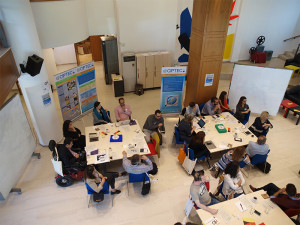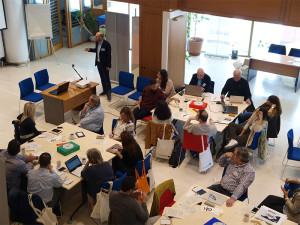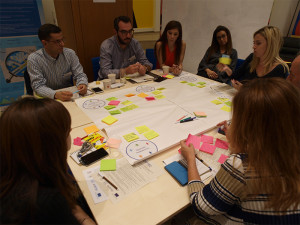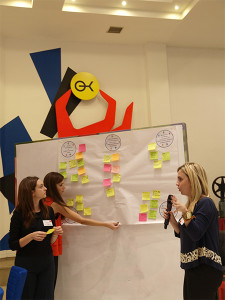Discussing possible synergies between social entrepreneurship/innovation and Public Transport in a CIPTEC local workshop at Thessaloniki
The CIPTEC local workshop on social entrepreneurship at Thessaloniki, entitles “Social Innovation/Entrepreneurship and Public Transport in Cities: Identifying barriers and opportunities”, was held on 20th of October, 2017. The participatory workshop was organised by AUTh and took place at the co-working space of OK!Thess initiative.
A warm welcome was made by Prof. Aristotelis Naniopoulos (CIPTEC coordinator) who inform the participants about the previous CIPTEC activities and the next steps towards the closure of the project. Thereafter, Mr. Evangelos Genitsaris delivered an introductory presentation on the workshop’s topic that included, among others, selected good example mobility-related practices in the field of Social Entrepreneurship/Innovation, as well as the basic terms and concepts with the aim of building a common understanding among the participants. Subsequently, Ms. Afroditi Stamelou explained the agenda, the process and the goals of the workshop.
In total, 22 participants took part in the workshop representing various disciplines, such as urban mobility and transport in general, social entrepreneurship and business management fields. At the beginning of the workshop, participants were divided into three heterogeneous groups. They introduced themselves presenting the activities of the organizations they are coming from and exchanged briefly personal views and experiences on workshop’s topic.
At the first session, participants were asked to investigate solutions and opportunities for satisfying important needs for Public Transport in Greece by developing Social Innovations and encouraging the creation of Social Enterprises. In other words, they identified potential synergies among Social Entrepreneurs and Public Transport focusing mainly on mobility of vulnerable population groups (PT buddies, “last mile” transport, etc.), information provision to vulnerable social population groups, mobility for all (overcoming the ‘transport poverty’) and environmental protection.
At the next session, the composition of the groups was rearranged and the participants, as members of new teams, were asked to identify the most crucial barriers for the development of Social Innovations and the launching of Social Enterprises tackling the challenges that were identified in the previous session. They were asked, also, to formulate a framework of key suggestions on policy measures that could favour the entering of Social Enterprises in the Public Transport sector in Greece.
After the presentation of all the workshop’s outcomes during a plenary discussion, participants evaluated them in order to identify the most interesting and crucial ones for introducing Social Innovation and involving Social Entrepreneurs in Public Transport sector. “Dot voting” method was used for this purpose. By the closure of the workshop, participants filled in an evaluation questionnaire assessing the workshop’s process and facilities.
To conclude, useful policy recommendations were suggested by the participants, especially regarding legislation issues in order to facilitate the introduction of Social Entrepreneurs in the provision of Public Transport. As far as the workshop’s evaluation is concerned, the majority of the participants were satisfied both from the sessions flow and the organizational aspects of the workshop.




